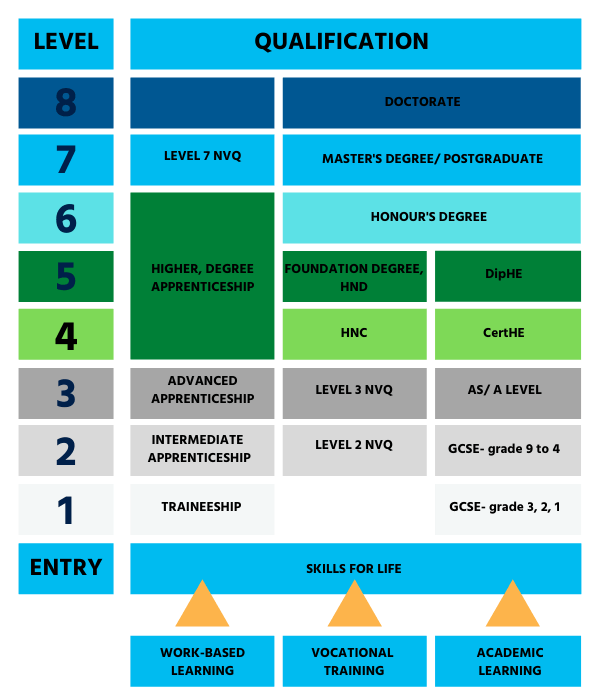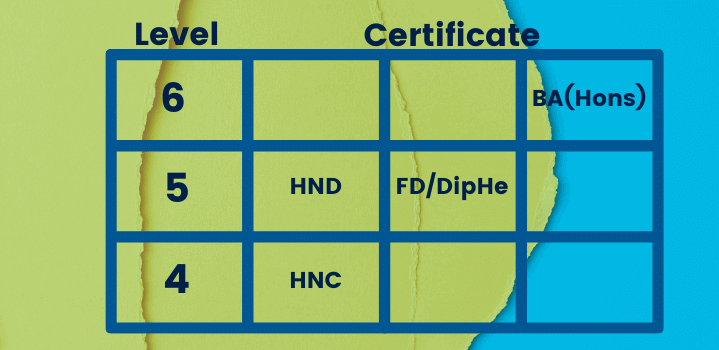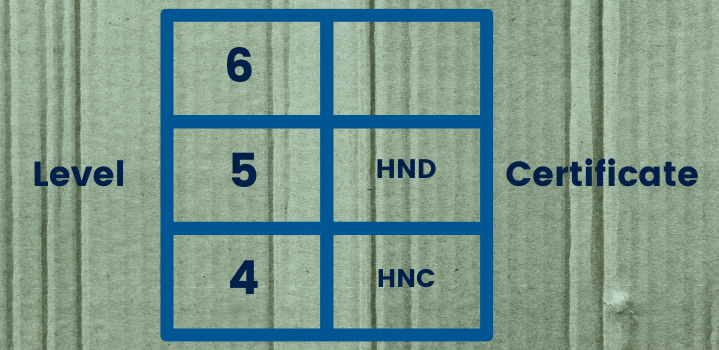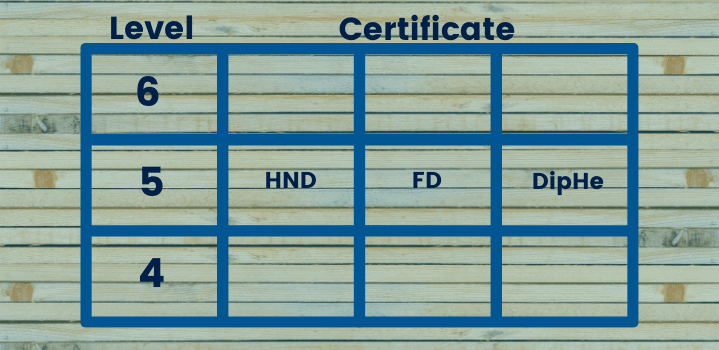What is an HND? and What does HND stand for?
It stands for “Higher National Diploma”, and this qualification shows that students have completed the equivalent of two years of university-level study, either at a university, college, or a work-based training scheme.
These courses focus on work skills and are great for career progression. They are ideal for taking part-time while working and typically take between 3 and 6 years part-time. Upon successful completion, many graduates go on to earn a full degree.
In this article, we will answer all questions related to what an HND is. But to start with, we need to understand where an HND sits in the higher education system.
We have collected a wide range of online HNDs to make your search easier.
UK Qualification frameworks
In the UK, nine levels represent the education system. For example, level 0, or Entry Level, covers courses aimed at basic life skills through to level 8, which denotes PhD level qualifications. However, be aware, in Scotland, there are 12 levels instead of 8.
The levels show how challenging the learning is. Qualifications at the same level are broadly equal in how challenging they are. However, qualifications at the same level may vary in content or the time required to complete them.
In the UK, there are four main qualification frameworks.
- Regulated Qualifications Framework (RQF) for England, Wales and Northern Ireland
- Credit and Qualifications Framework for Wales (CQFW)
- Framework for Higher Education Qualifications for England, Wales and Northern Ireland (FHEQ)
- Scottish Credit and Qualifications Framework (SCQF)

What level is an HND?
A Higher National Diploma is a Level 5 qualification. HNDs are at the same level as Foundation Degrees and Diplomas in higher education (DipHE). This level of study is the equivalent of the first two years of a Bachelor’s degree.
With study at this level, you typically gain the skills, knowledge and understanding in a specialist area or professional setting.
For example, you’ll be able to:
– increase the depth of your knowledge in an area or subject;
– understand complex problems and situations by analysing their causes;
– manage a team effectively with strong leadership qualities;
– use IT systems for advanced business processes.

What level is HND in Scotland?
In England, Wales and Northern Ireland, they are classified as Level 5 qualifications. However, in the SCQF Framework, they are a Level 8 qualification.
Is HND the same as BTEC?
BTEC stands for Business and Technology Education Council. You will come across the BTEC acronym on several qualifications. From level 0 (Entry Level) to level 5.
Due to historical changes in the structure of the exam boards that award certification and benchmark curriculum in the UK, you will come across several terms for HNDs and HNCs such as BTEC HND, Edexcel HND, Pearson HND, BTEC Higher Nationals and Pearson Edexcel HND.
The important part of the certificate name for students is the HND (Higher National Diploma) part. When you are applying for your course, ask for a copy of the course specification. You will see the current name of the awarding body and the course validation.
What is an HND worth in UCAS points?
As an HND is a level 5 qualification it is not generally used for UCAS tariff points. Tariff points are usually only relevant for level 3 qualifications.
If you already have an HND, you will have in effect already completed the first two years of an undergraduate degree. A top-up degree is the best way to gain a full degree using your existing qualifications as long as it is in the same subject area. E.g. You have a Higher National Diploma in engineering and want to take an engineering top-up BSc degree.
However, if you are looking for a complete change in direction, say from engineering to nursing, you might need to start from year one again at university. In this situation, you will classify as a mature student if you are 21 or older. The best advice is to speak directly with the university admission’s team to find out precisely what you will need to demonstrate to join your chosen course.
What are the entry requirements for an HND?
A Higher National Diploma begins at level 4. For admissions, this means that you would typically need level 3 qualifications to gain access to the course. Example Level 3 qualifications are A levels, BTECS and NVQ Level 3.

If you have relevant work experience, you might be able to gain access to an HND without a level 3 qualification by using professional certification and training. However, this is not guaranteed, and each education provider will have its own guidelines.
You should check your chosen course provider or college to determine what they will accept for entry requirements if in doubt.
When can I take an HND?
A traditional time to start an HND is after completing A levels or another level 3 NVQ or BTEC qualification.
However, many people work full-time and then study part-time on an HND course. Because of the practical nature of an HND, this is often a good option for those who want to boost their career prospects whilst keeping their current career momentum. Many education providers have rolling intakes, every month or quarter, that are ideal for working professionals.
How much does an HND cost?
If your university or FE college is in England, Wales or Northern Ireland, most of them cost between £2,000 to £6,000 for each year of full-time study. However, you should always check the exact costs with the course provider to get a more accurate figure.
In Scotland, an HND costs around £1,400, and you can get money from SAAS (Student Awards Agency Scotland).
Can I use a student loan for an HND?
Yes, however, part-time students need to check that their course meets the course intensity criteria with student finance.
If you are studying part-time, the course needs to be 25% of the ‘Course intensity’ or more of the equivalent full-time course. Again, your course provider will be able to give you this information when you are applying.
How long does an HND take?
An HND takes two years to complete with full-time study. However, many people study part-time whilst working. Studying part-time, you can achieve a Higher National Diploma in 3 to 5 years.

Here are some tips on how to manage full-time work and online study.
Where can you study an HND?
Universities, FE (Further Education) Colleges and some private education providers offer Higher National Diplomas in the UK. However, not all of them provide online Higher National Diplomas. This page has a collection of online HNDs that you can filter by subject area.
Is HND a professional qualification?
Yes, Higher National Diplomas are recognised professional qualifications. However, historically they were designed and created to be vocational and give students real-world practical skills and analytical abilities to deal with real-world situations. Therefore, all HND have either an industry or career focus.
What’s the difference between an HNC and an HND?
The difference between an HNC Vs HND is the level.
Higher National Certificates (HNC) are Level 4 and are equivalent to the first year of a university degree.
Higher National Diplomas (HND) are Level 5 and are equivalent to the second year of a university degree.

Many students complete their Higher National Certificate and then progress to a Higher National Diploma.
Is an HND equivalent to a degree?
The answer is that it’s the equivalent to two-thirds of an honours bachelor’s degree.
Or another way to put it:
An HND has the same academic weight as the first and second years of a three-year UK degree course.
Many students progress to take a top-up degree course and graduate with a full Bachelor’s degree. You can learn more about top-up degrees here.
What’s the difference between HND and DipHE?
A DipHe (Diploma of Higher Education) is equivalent to an HND as both qualifications are Level 5. However, a Higher National Diploma is typically more vocational than a Diploma in Higher education is more academic.
Presentations, projects and coursework are the primary assessments on a Higher National Diploma (HND). A Diploma of Higher Education (DipHE) is more like a degree. It is more academic and evaluated by traditional essays and or exams.

Is an HND the equivalent to a Foundation Degree?
Yes, a foundation degree is a level 5 qualification, the same as an HND. However, a foundation degree is similar to a Diploma in Higher Education as its focus on learning is more academic. In contrast, a Higher National Diploma is a more vocational qualification.
What is next after an HND?
Many students find that having a Higher National Diploma leads directly to higher pay and improved promotion prospects due to the professional focus of the course. However, for some students, building on their learning experience, opt to ‘top up’ their qualification with a Bachelor’s Degree.
A top-up degree is a course specially designed to take into account previous studies. This article has more information about how you can gain a full degree with one extra year of full-time study once you have an HND.
Can I get a job after HND?

Higher National Diploma graduates are in demand across many sectors. A quick search on google for HND jobs will bring up a wide range of vacancies.
In addition, due to the vocational nature of the courses, many education providers have links with industry, and you may find that opportunities open up while on the course through this network.
Suppose you are taking your HND part-time online whilst continuing to work. In that case, the vocational nature of the course may well open up opportunities before you even finish the course. Often, showing dedication to self-improvement is enough for employers to fast track the next promotion.
Can an HND get you into university?
Yes, a Higher National Diploma is a stepping stone to university for those who want to gain a degree. Moreover, once you have finished an HND, you can join the final year of a degree, as mentioned above.
Can I do a top-up degree in a different subject to my HND?
It is not ordinarily possible to joins a top-up degree in a different subject area to your HND. Most universities will look for a level 5 qualification in the same subject area.
There are some possible exceptions to this. For example, suppose you have extensive professional experience in the top-up degree subject area and a level 5 qualification in an unrelated field. In this case, you might be able to gain access based on your work or voluntary experience. In this situation, you have nothing to lose by asking.
Can you do masters with HND?
Most universities will look for a bachelor’s degree to access a master’s programme. The standard progression route for an HND graduate is to take a top-up degree and then move on to a master’s.
Suppose you are a mature student (25+ years old for postgraduate) and have extensive leadership and management experience. In that case, you might be able to join a master’s based on your career experience at some universities.
Can I do MBA after HND?
A Higher National Diploma on its own will not give you access to an MBA. In this situation, you would need to take a relevant, business-related top-up degree and then move on to an MBA.
However, suppose you are a mature student and have extensive management level experience of 5 to 10 years. In that case, some universities will accept you onto their MBA programme based on your career experience, but this is not guaranteed.
